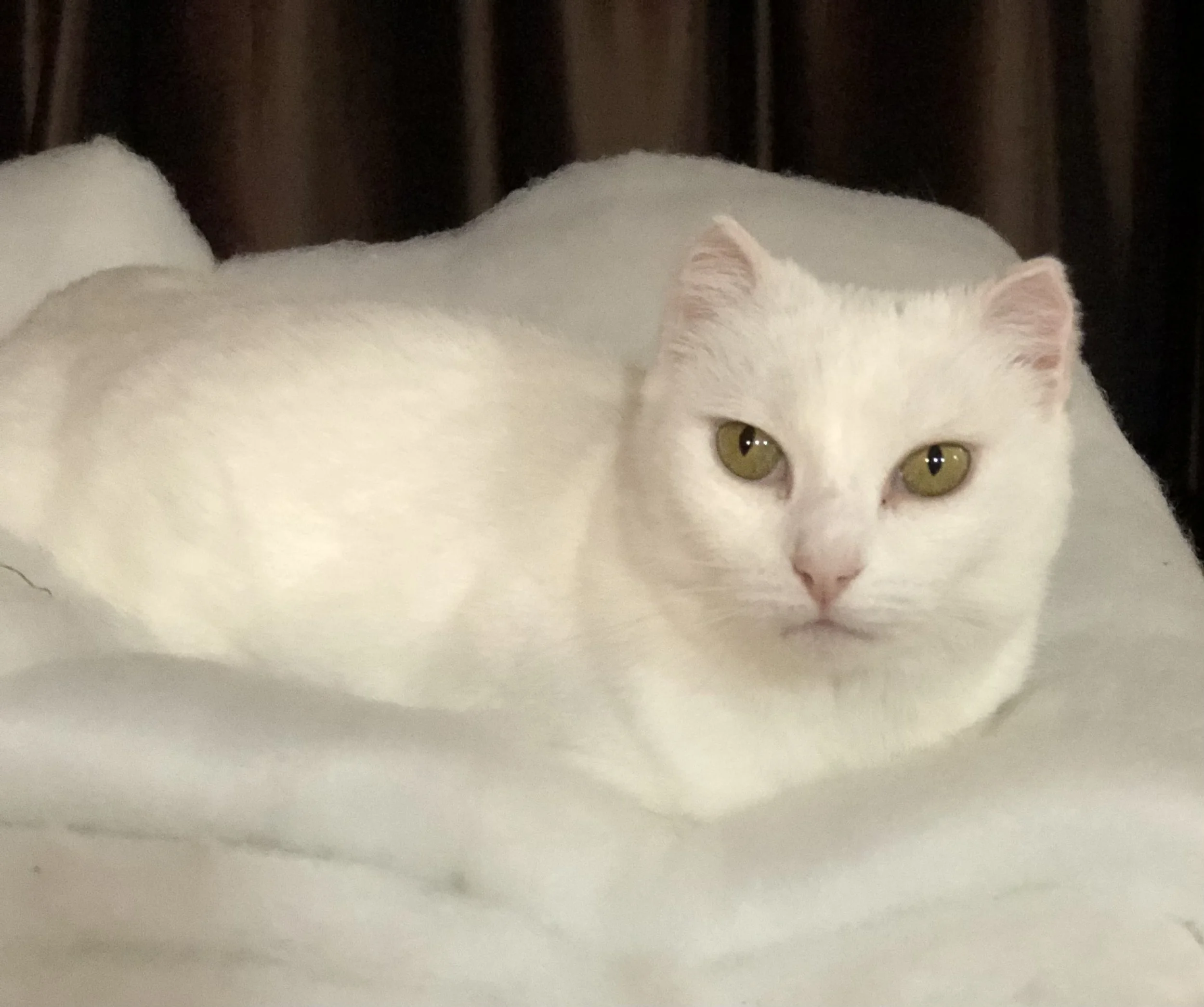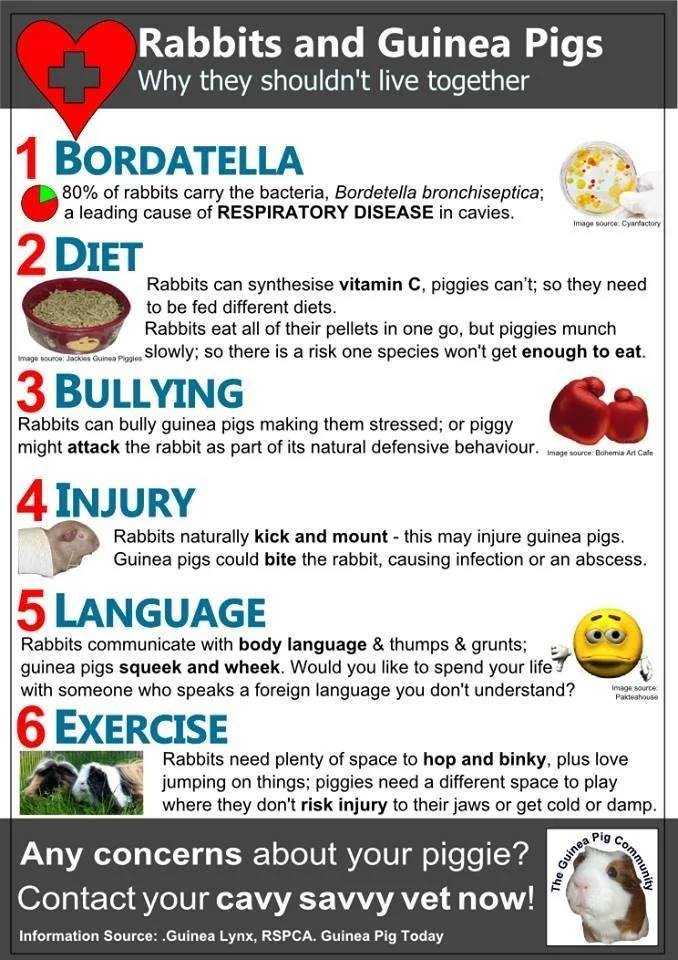Rabbits & Other Animals
Cats
Hayley Marshall is an Animal Behaviorist who has worked with animals for over 20 yrs and has this information to share with us …
"Predator and prey combos are never a "safe mix". Both animals can be fine one second and tune into their instincts the next.
This means its a dangerous combination.
When the predator instincts kick in, it doesn't matter how " nice" your animal normally is with the prey animal" all that goes out the window.
The instinct to hunt will always outweigh the emotional connection...ALWAYS!!
It only takes a second, and a life can be gone.
By all means there can be exceptions to this rule and friendships can be made, but they aren't a stable "bond", so its vital you never, EVER leave them unattended!!! Always make sure there is a safe place for bun to run to that the predator can't get into, always! You will never out run them if a dispute kicks in, so having several safe places is a essential!!
Let's look at stress...It's a constant stress for a bun being in that situation, even when they appear "100% content" they aren't! They are masters of disguise and they are wired to be "calm" in danger before they bolt as a last resort. They also "play dead" to cope with the stress levels and trick the predators instincts into leaving them alone. Unfortunately humans misunderstand this and go "Oh look how happy they are! They are sleeping together " 99.9% of the time it's not the case. That's just a human's perspective and we are almost always reading it wrong!! Prey response mode at some point will kick in and that is the part that's dangerous. As the predator goes into their default "hunt it mode."
It's best not to leave anything to chance and treat every predator/ prey encounter as if you are the supervisor of biting, grumpy toddlers."
Further thoughts … a cat who lives with a house rabbit might still stalk and chase a rabbit he met outdoors. It might even pursue its own rabbit-friend if they encountered each other outdoors. Conversely, a rabbit who is friends with ‘his’ own cat, may still be very vulnerable to predation from a neighbour’s cat outside.
In both scenarios, the environmental cues would set the instinct in motion.
The lesson here -
* Make sure you set up a situation where your cat is unlikely to feel predatory.
* Even if your rabbit has a feline friend, it could still be terrorised by an unfamiliar cat.
* Never assume that your cat will not harm your rabbit even if they are 'friendly acquaintances'.
* Rabbits and cats 'speak' completely different languages. Whilst a cat may not mean to hurt your rabbit it can very easily and quickly do so.
Further Reading:
Indoor house cats typically will peacefully coexist with pet rabbits if given proper introductions and supervision. Some even develop close friendships.
Rabbits & Cats - House Rabbit Society
Some ideas on introducing cats and rabbits in ways that minimise stress for all concerned.
Cats and Rabbits – Georgia House Rabbit Society
The individual dog and its breed type will weigh heavily. Also, the individual rabbit will play a factor. There are a few rabbits that are just terrified of dogs. Many, however, seem comfortable with the family dog once they have been properly introduced. Certain dogs, based on their breed, will simply have too much genetic disposition to overcome. Their prey drive will just be too strong. Yet there are still many breeds of dog that will accept the rabbit(s) as part of the family pack.
This website has a really good information about how to go about introducing rabbits and dogs and the sort of factors you will need to consider:
Rabbits with Dogs - Rabbits Indoors
Introducing a Dog to a Rabbit - Rabbits Indoors
Much is made of the way that infant animals will imprint onto an adult of another species when this adult is the first being in their new lives. Apparently they either assume that the adult is a member of their own kind or they fail to have a sense of their species. But this certainly does not explain bonding between very different adult animals. That relationship entails the more interesting process of animals actively changing their views of partnering in order to be mutually compatible. The recent bonding between a rabbit at my house and a new, very strange roommate reaffirms my long-held intuition that rabbits not only make choices about their partners but modify their attitudes in the interest of a relationship.
When Worlds Collide: Rabbit Meets Chinchilla - House Rabbit Society
Guinea Pigs
PLEASE NOTE – Westley’s World does not recommend, condone or support keeping GPs and rabbits together.
Rabbits and GPs -
* Have different nutritional requirements and need different foods to meet their different dietary requirements; guinea pigs need a diet rich in Vitamin C or else they can become ill. Rabbits are the opposite and may become ill from too much Vitamin C or a lack of other important vitamins. The 2 animals sharing the food may make it difficult to know which animal has eaten what.
* Communicate differently so it is in both of their interests to have a friend that talks the same language. You wouldn't want to lead your life living only with a gorilla for company - you might get on but could never understand each other properly!
* Rabbits are a lot stronger than guinea pigs and can easily hurt or even kill a guinea pig without meaning to, simply by kicking out with their powerful back legs or jumping over the guinea pig. The rabbit may also bully the guinea pig. Sometimes guinea pigs ingest rabbit fur which can cause them problems.
* In the wild, rabbits run fast and free, covering the equivalent of 30 tennis courts daily. Guinea pigs have little legs and despite needing lots of space and exercise themselves, it differs greatly to the type of space rabbits need to hop, run and jump.
* Rabbits can pass Bordetella - a bacteria, onto guinea pigs, which can cause serious respiratory disease in them.
These differences aren't to say that you can't keep both types of animals in the same household, but keep them separate from each other and pair up with an animal of its own kind. If you currently have a guinea pig then get him or her a guinea pig friend. If you have a rabbit then get another rabbit - it's a myth that getting a guinea pig friend for a rabbit is cheaper!
Source with edits: Can I keep a rabbit and guinea pig together? - Save-a-Fluff
A rabbit's best companion is another friendly rabbit. A guinea pig's best companion is another friendly guinea pig. Keeping rabbits and guinea pigs together is not an ideal combination.
Keeping rabbits and guinea pigs together - RSPCA
Can you keep rabbits and guinea pigs together? - RSPCA
Chickens
Rabbits and chickens aren't made for each other. Consider issues such as diseases, care, food and other concerns before putting them together.
Diseases that Rabbits and Chickens can Contract
The major reason for keeping rabbits and chickens apart is disease. Chickens can infect rabbits, and vice versa. While coccidia is common between both species, salmonella, pasteurella multocida and streptococcosis pose more significant problems. Salmonella is endemic to chickens and can make your rabbits sick. Likewise pasteurellosis can cause cholera if transferred from rabbits to chickens. Because chickens will eat rabbit faeces and defecate wherever they are, it is likely that both species will share diseases, which could prove fatal.
Keeping rabbits in with chickens also heightens the risk of the rabbits suffering from fly strike because chicken poops attract a LOT of flies. If the rabbits also become soiled with chicken faeces then it is pretty much a given that they will become fly blown.
Feeding your Chickens and Rabbits
Chickens and rabbits have different nutritional needs. If your chickens eat your rabbit food, or vice versa, it can cause severe nutritional deficiencies. Unless the food is separated from each species, both are likely to get into each others' food. Rabbits eating chicken food may become obese. Furthermore, chickens likely will defecate in the rabbits' food, causing the potential spread of disease.
Keep them Separated
The good news is that it's easy enough to give your chickens and rabbits enough room without having them contaminate each other's space. Keeping your bunnies in an enclosed run that chickens can't get into is one way to ensure that your animals stay healthy. Another is to have a dedicated coop and run for your birds. That way, you can enjoy your rabbits and chickens.
Hedgehogs
The main issue is with Hoggies is that they can carry and suffer from Mange and Ringworm. They also sometimes suffer from Giardia and Coccidiosis. However Coccidia is species specific so there is no threat to your bun. In my experience, usually these diseases are only a problem if the Hoggie has Mange and their immune system is compromised. Keeping this in mind, Hedgehogs are actually no more 'disease ridden' than say a feral dog or cat. Hoggies gained the reputation of being disease ridden because the only ones you normally see are sick ones that are out during the day. You don't see the many, many healthy ones out during the night.
So - are Hoggies a risk to your rabbit? Opinions vary. Hedgehogs are very good climbers and diggers. They can and do climb into and dig under insecure enclosures. They are usually seeking warm, sheltered places to nest. they may also be looking for water or any possible food especially if they are starving and/or dehydrated - usually due to having Mange. This doesn’t mean your rabbit is at risk of being ‘attacked’ though.
I have wild Hedgehogs in my garden and although my rabbits do not free range in the garden (because I do not think this is a safe thing to practice), they do have access to a secure, moveable grass pen during the day. I am not overly concerned about my local Hoggies having been on the grass. If you are concerned then the best approach is to hog proof the perimeter of your garden to restrict access on to the area(s) of your property that Hedgehogs may have access to.



